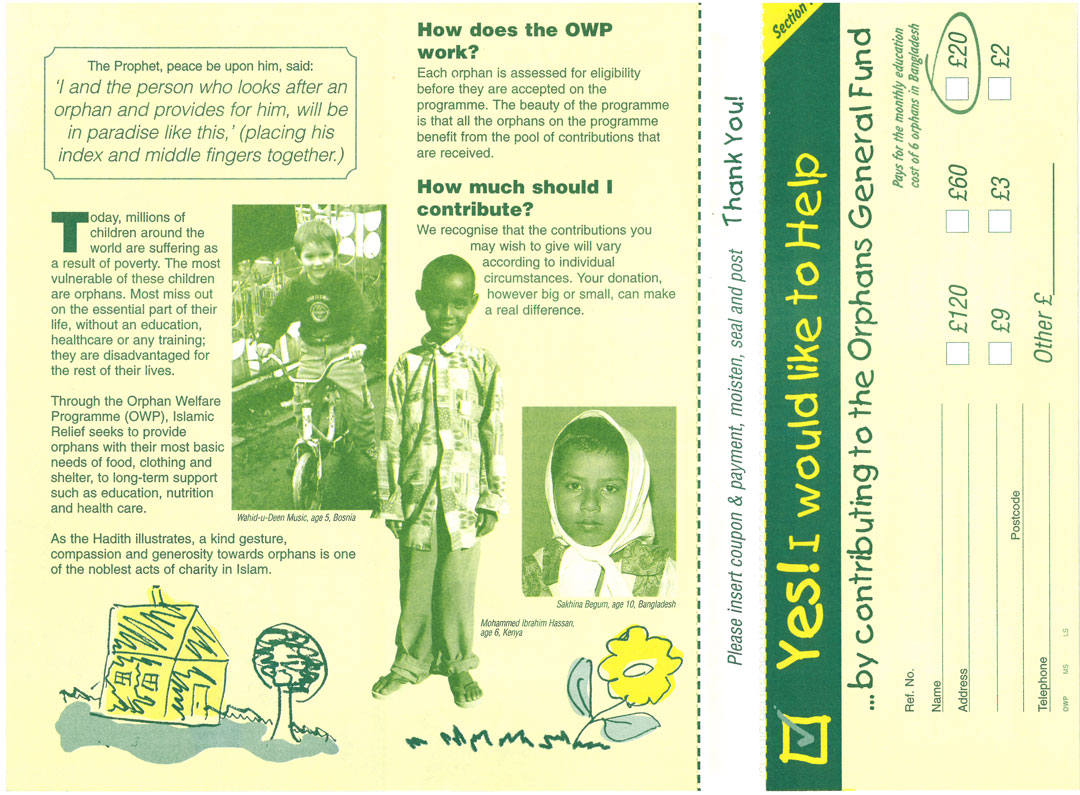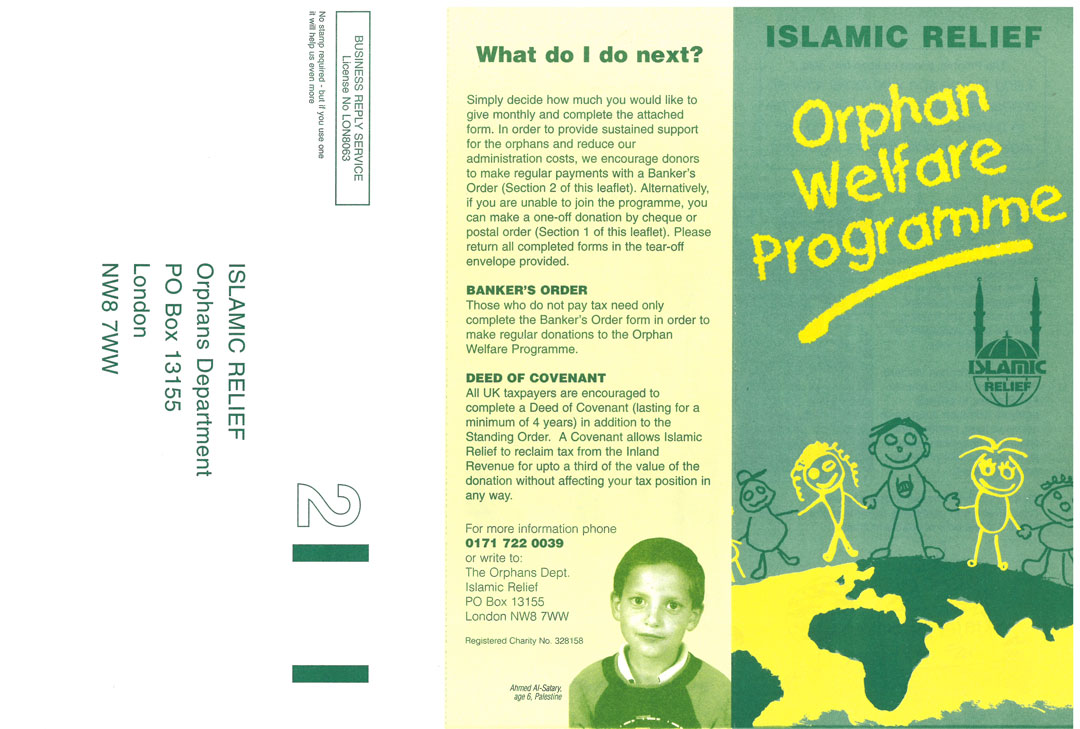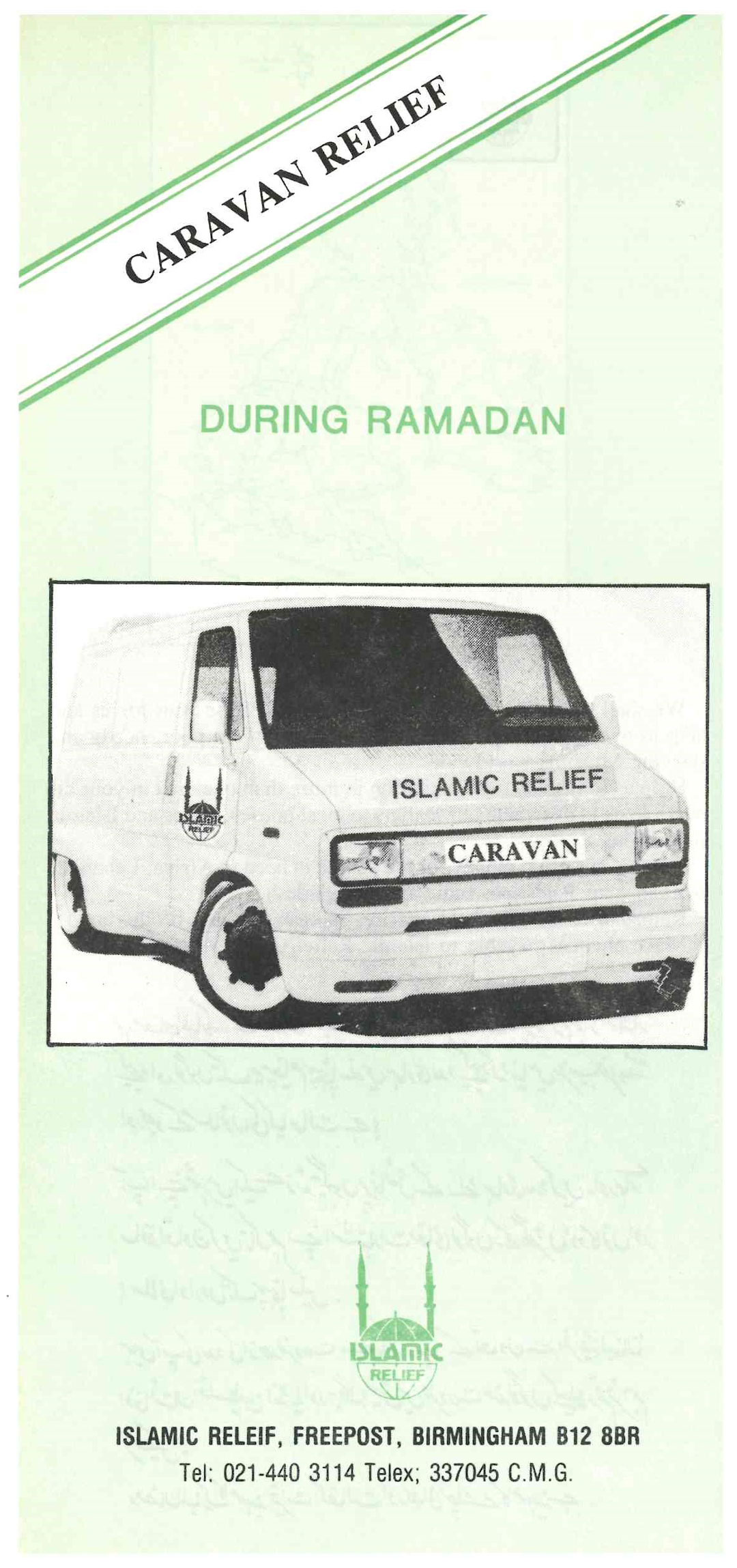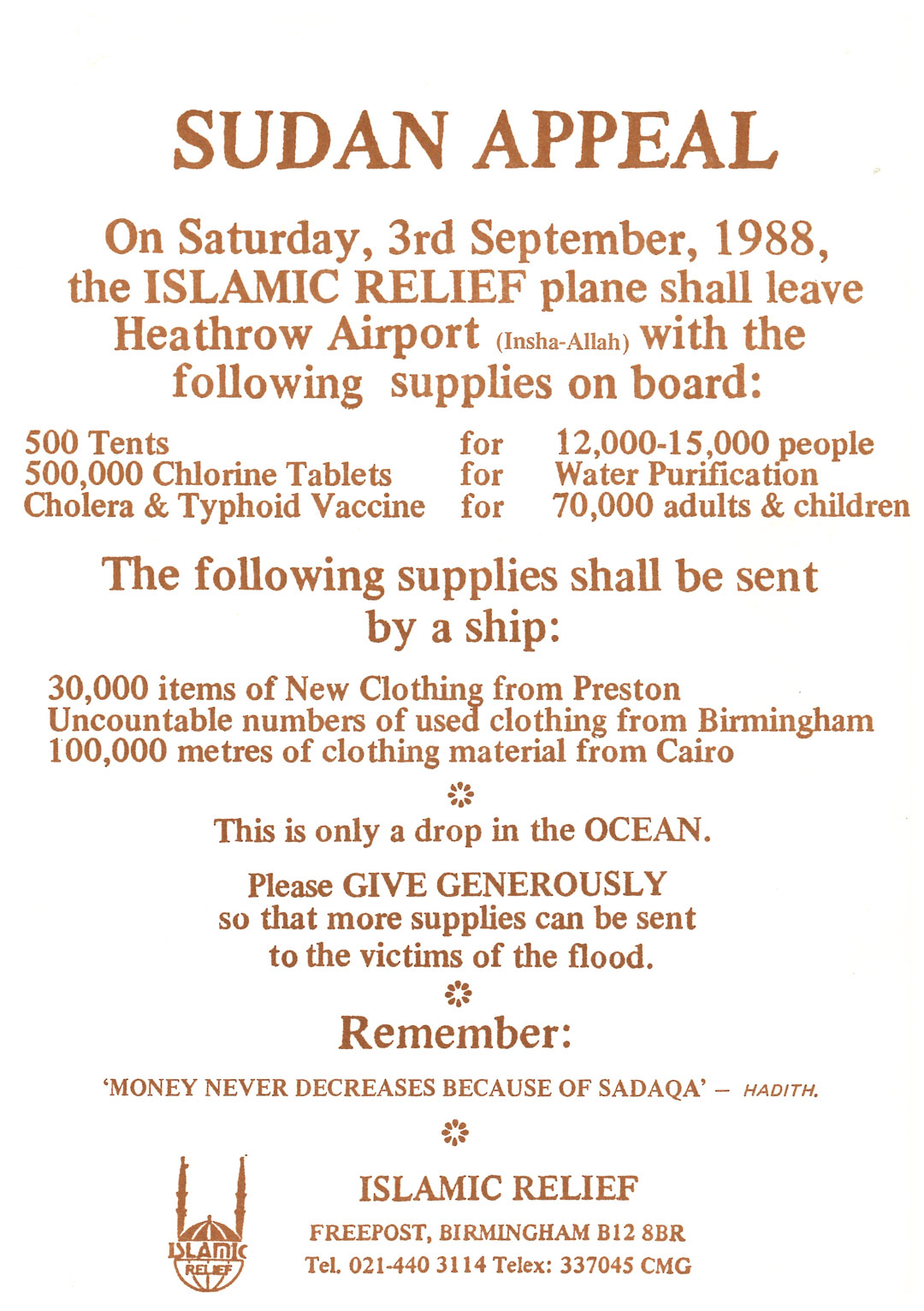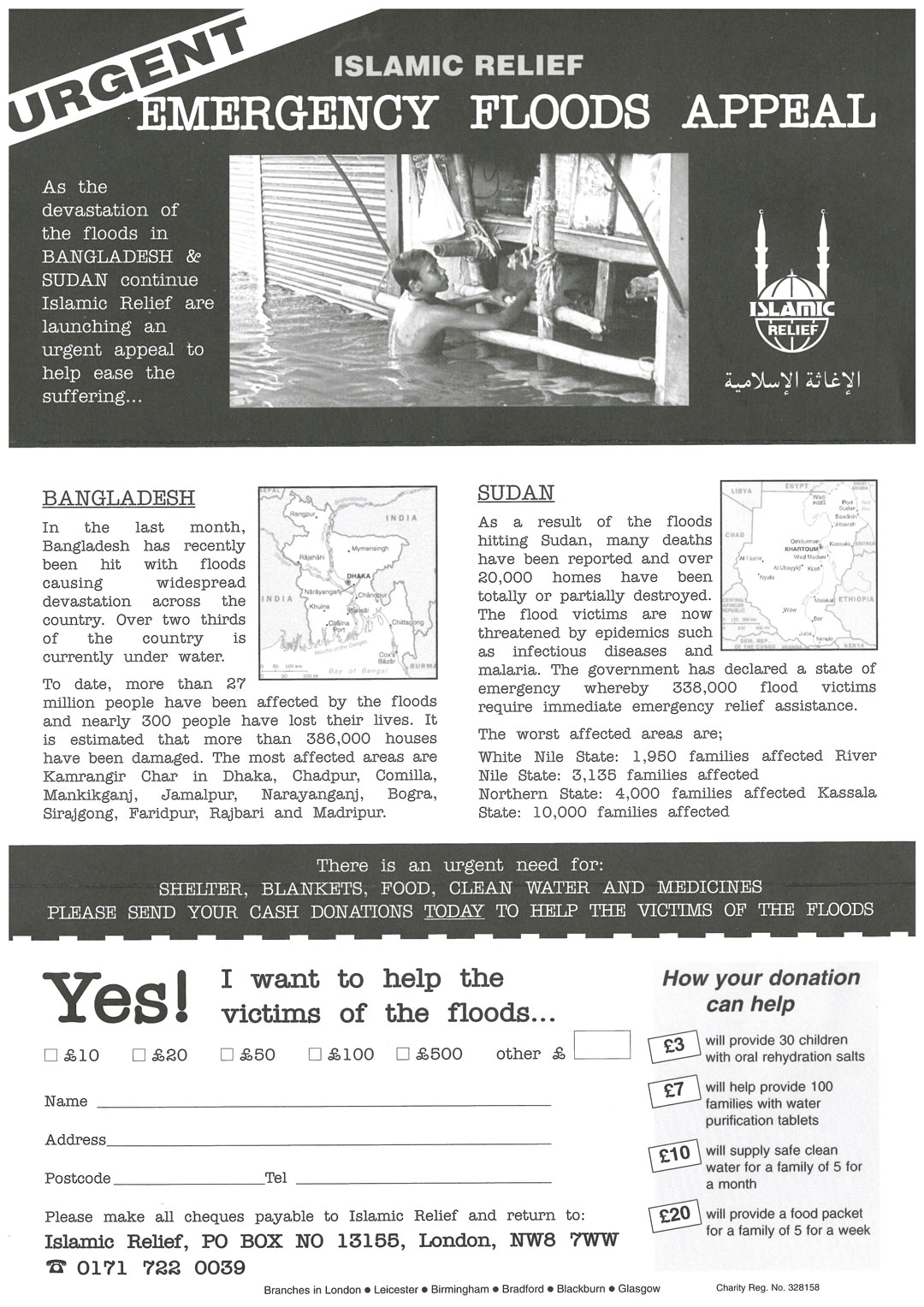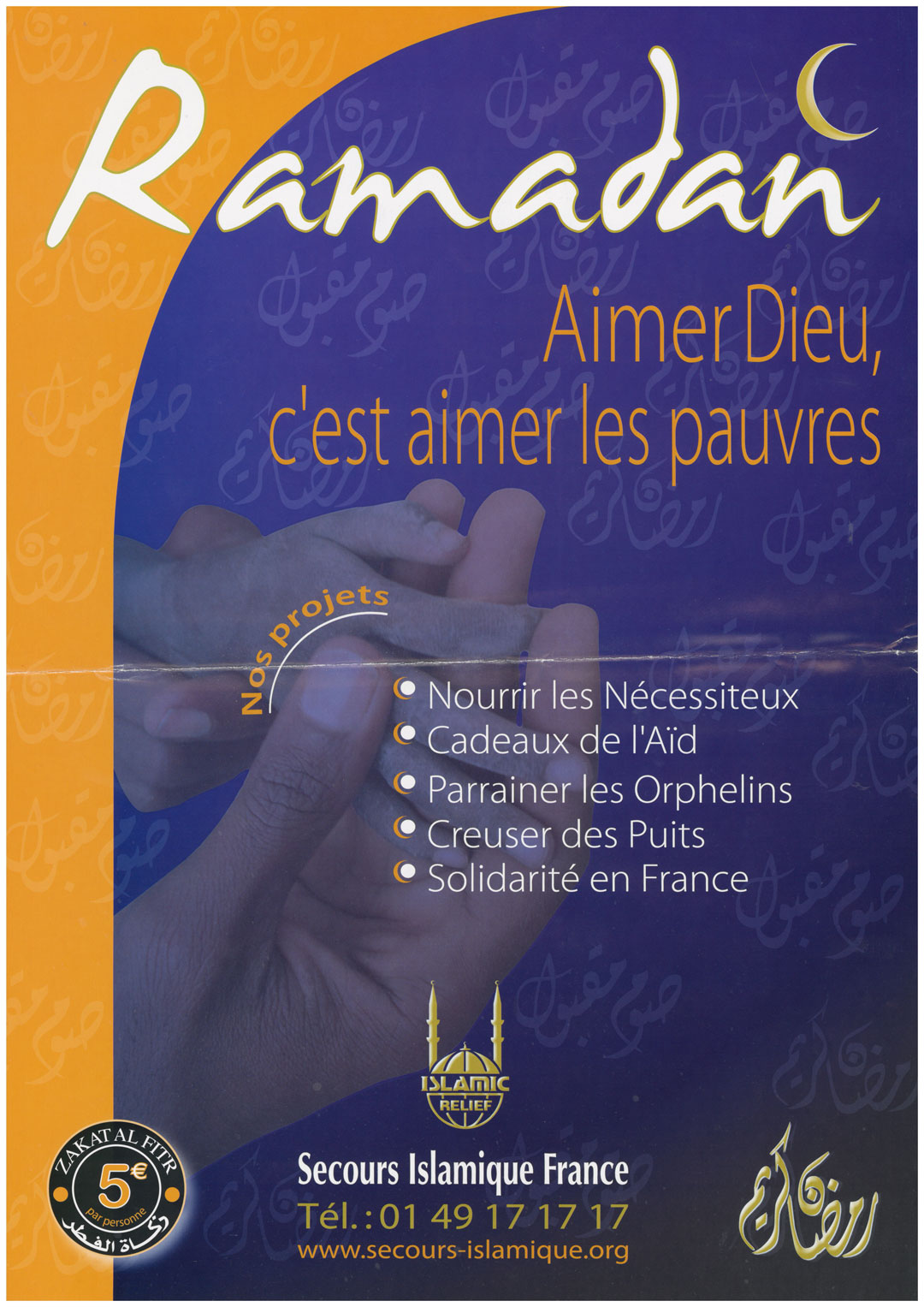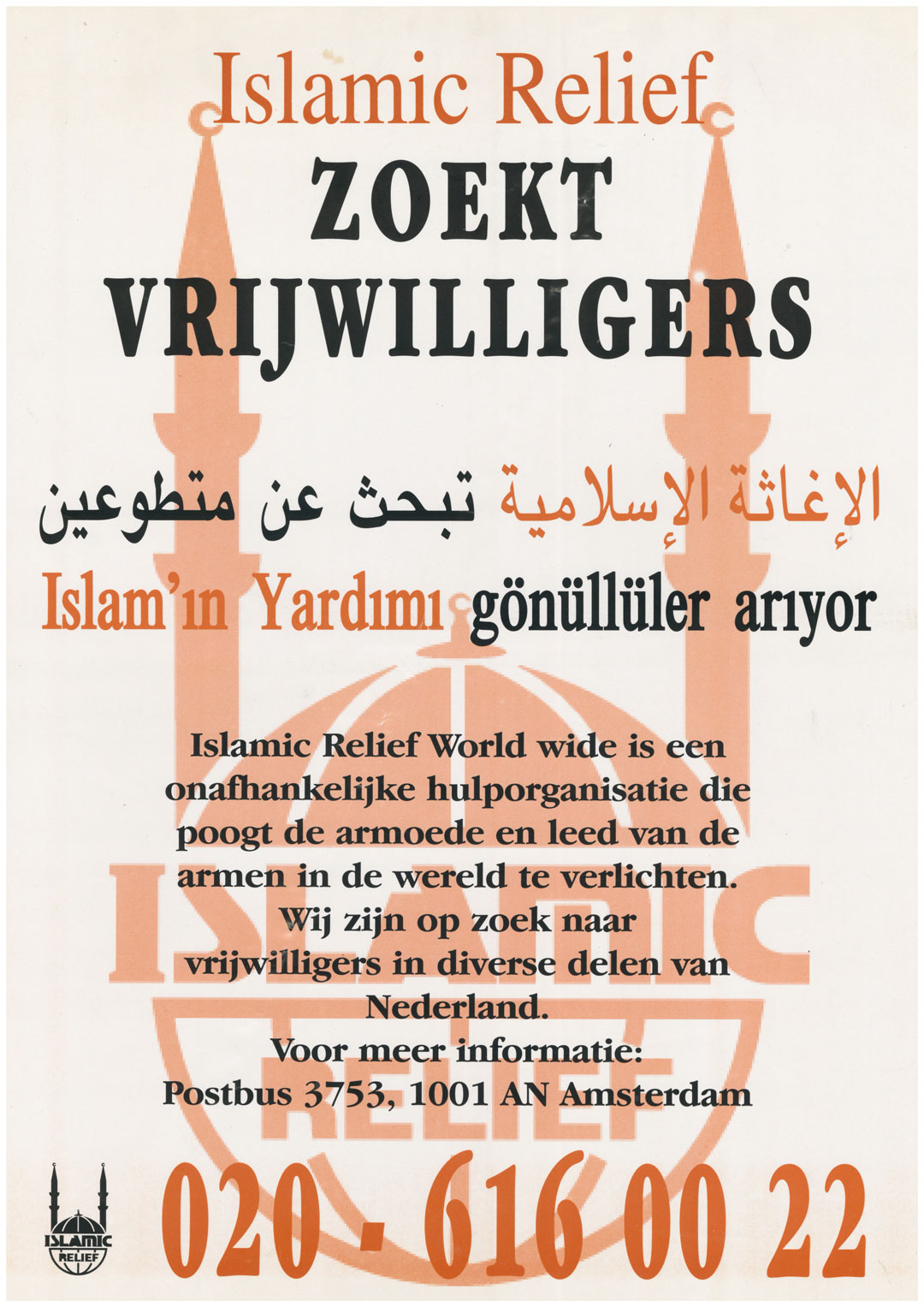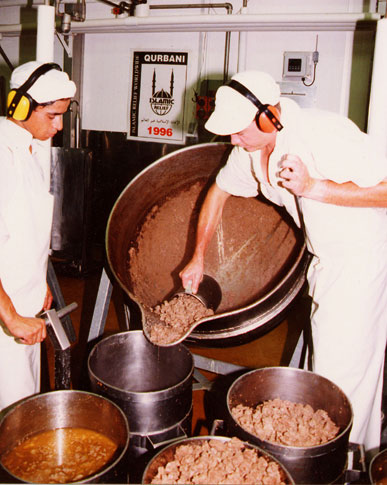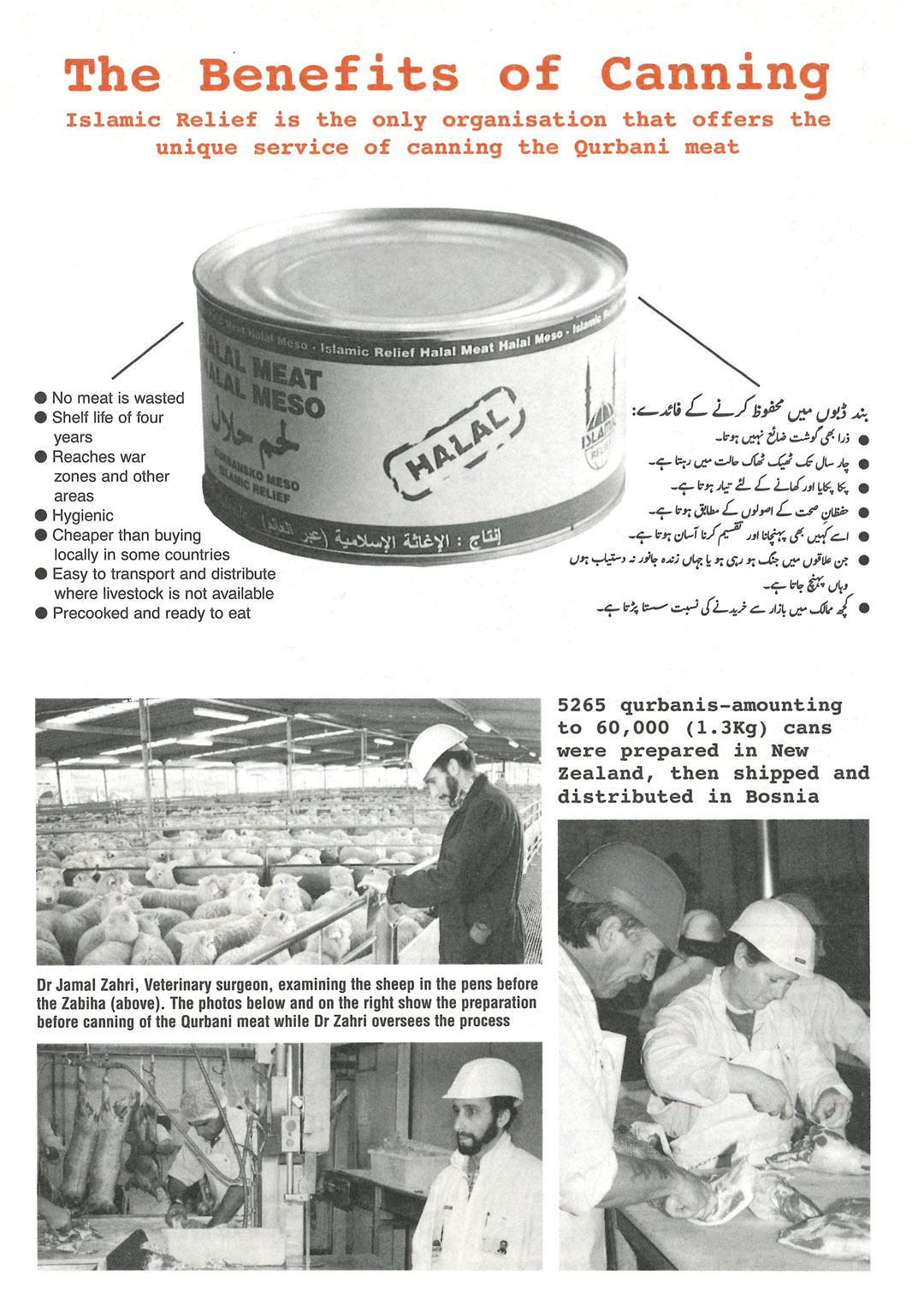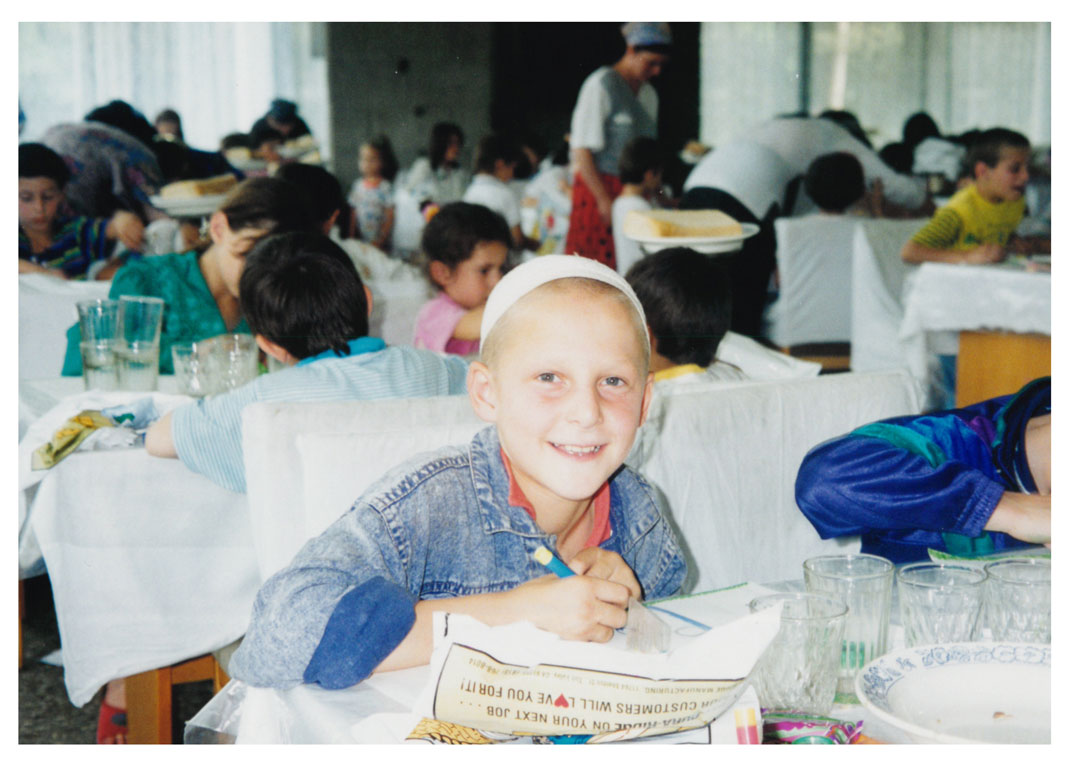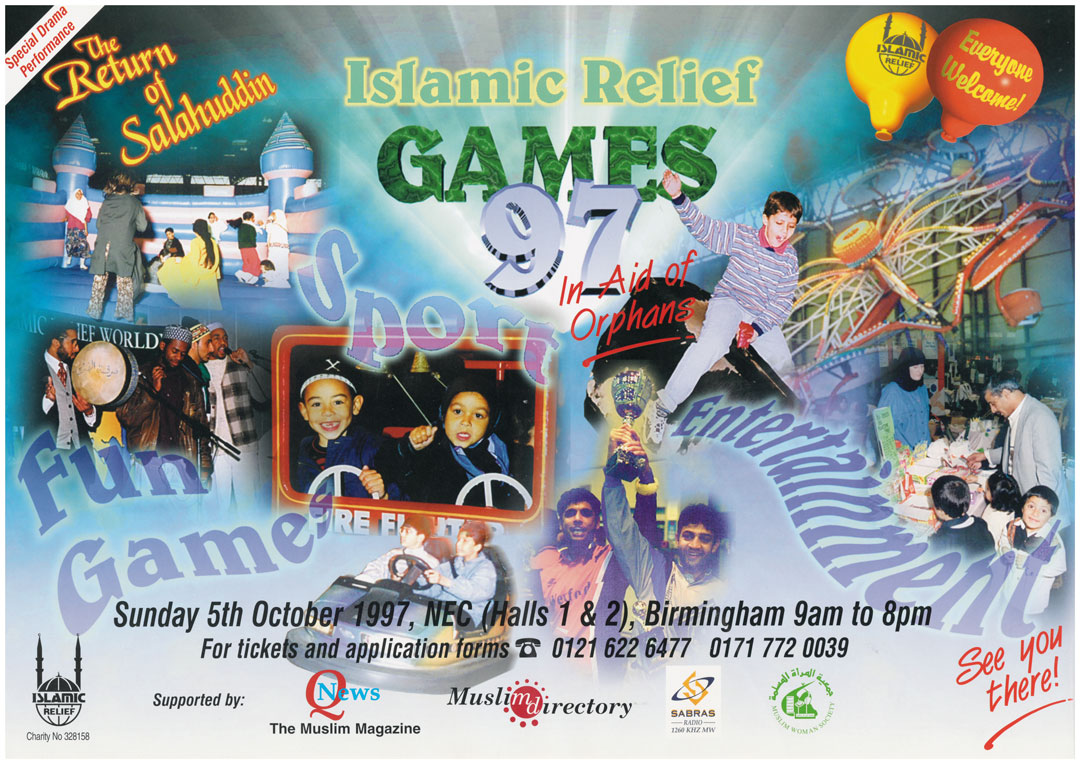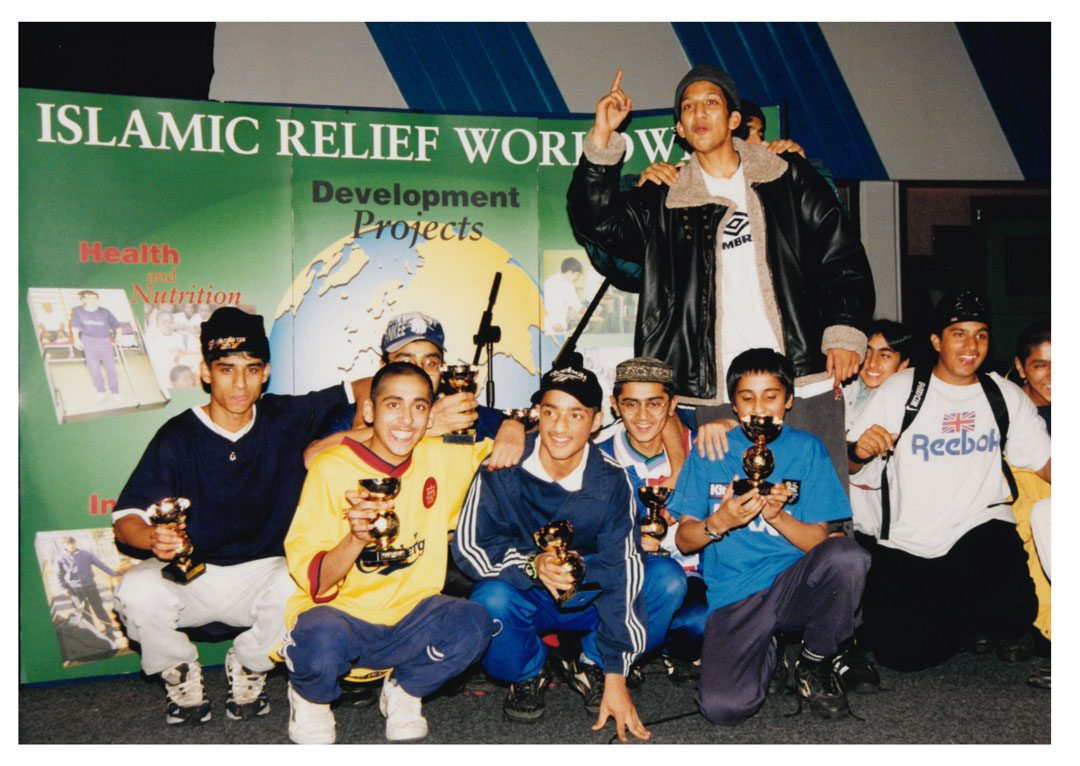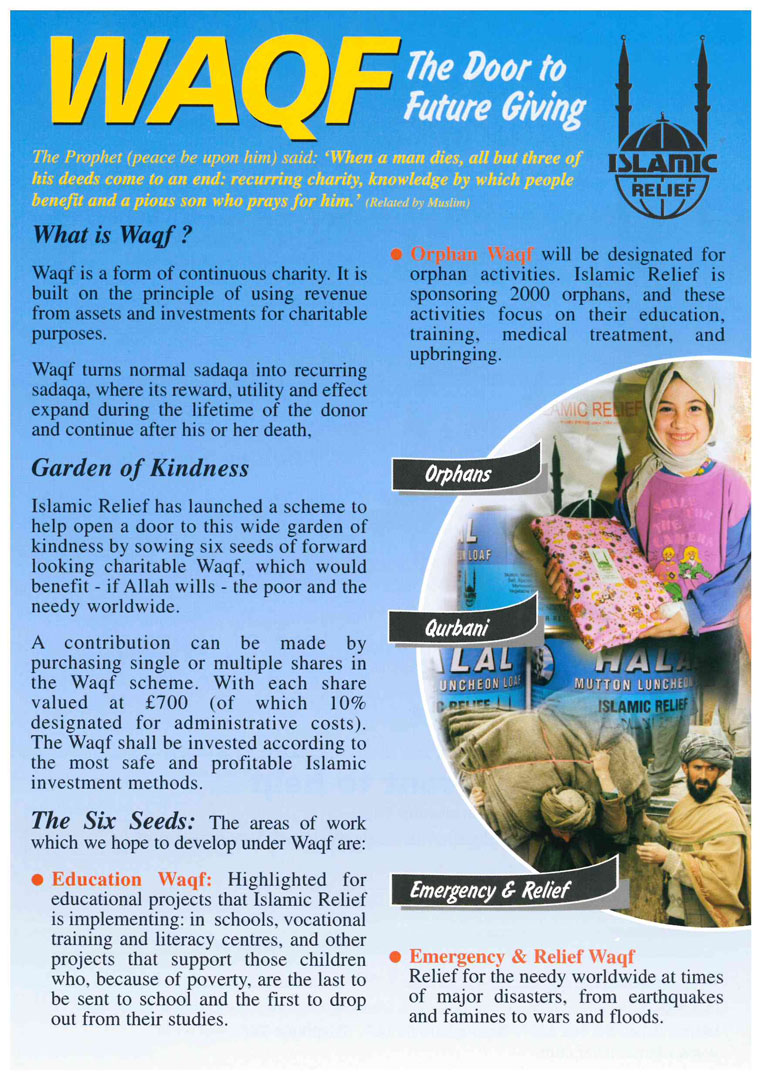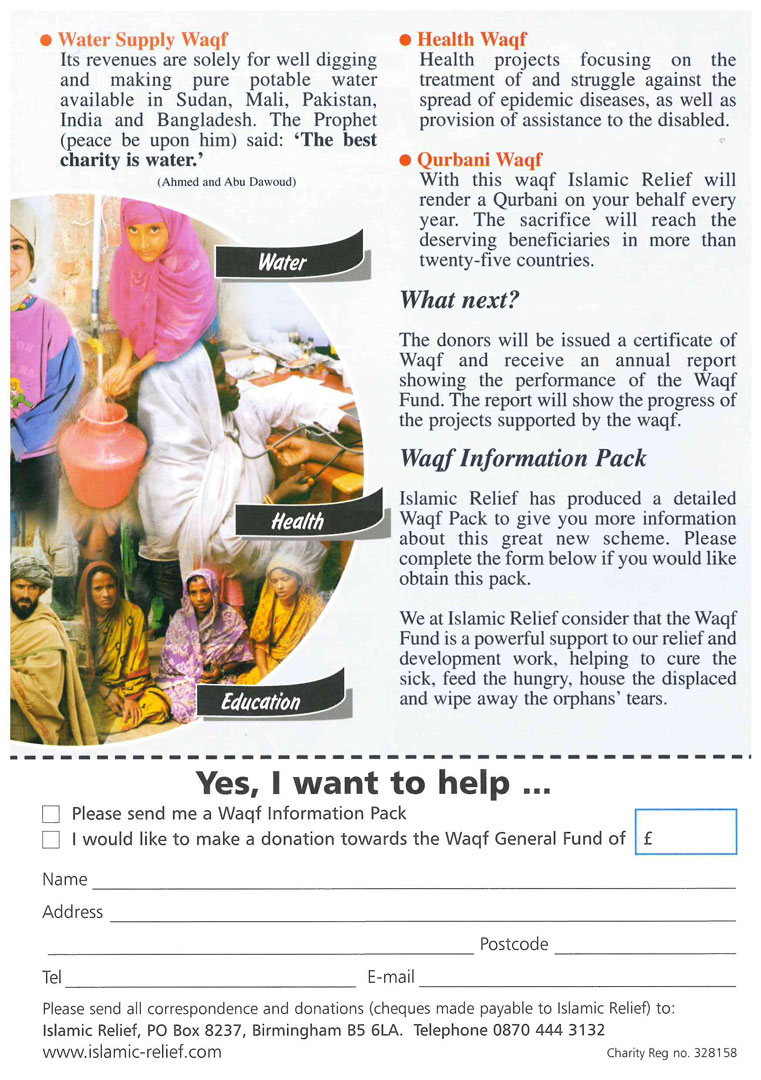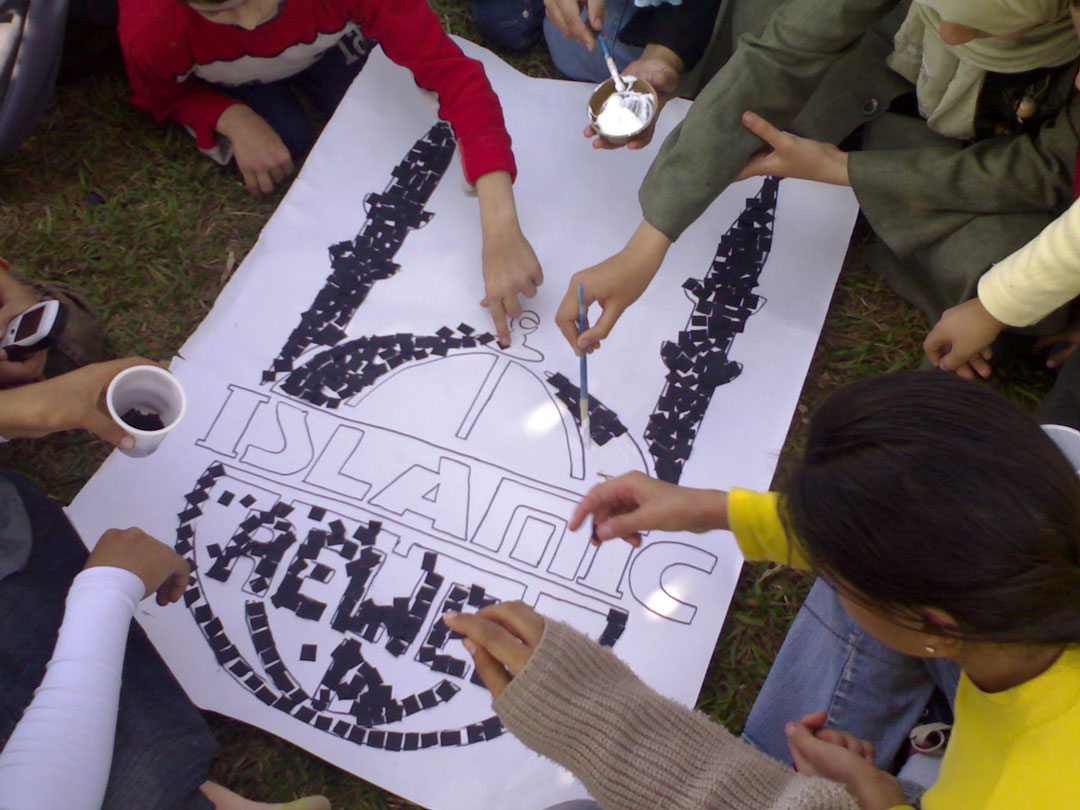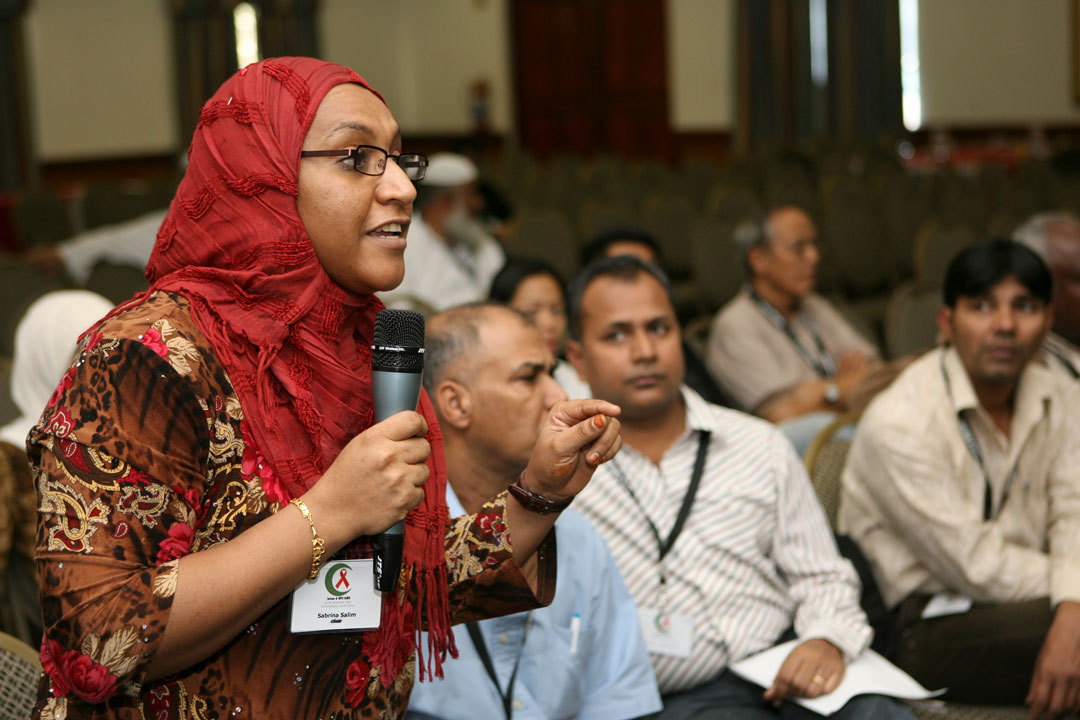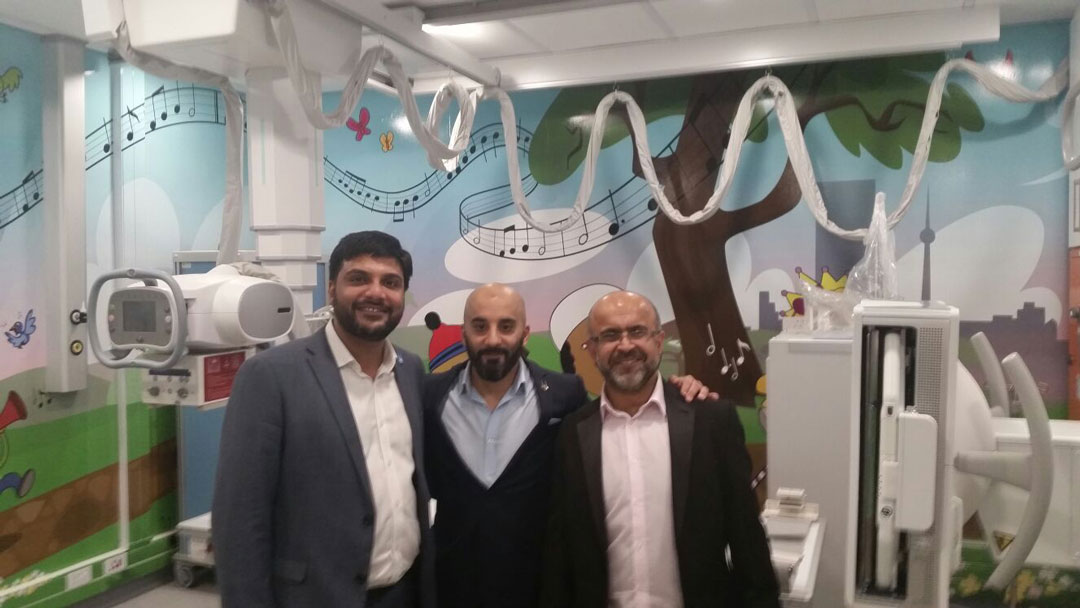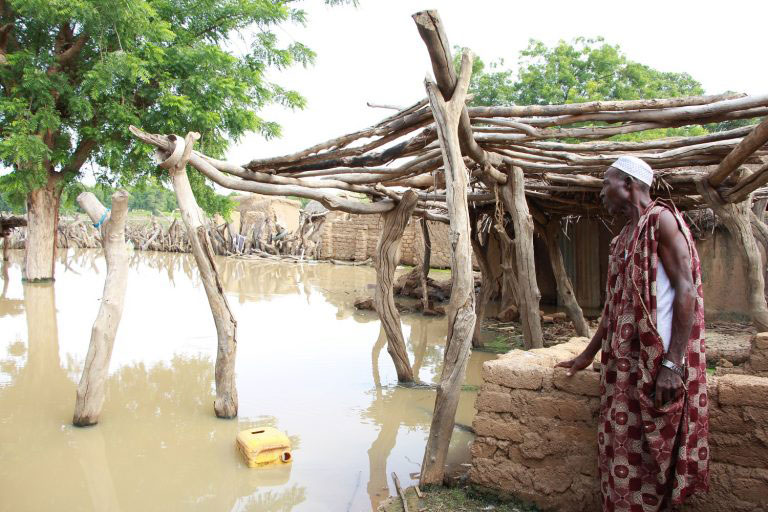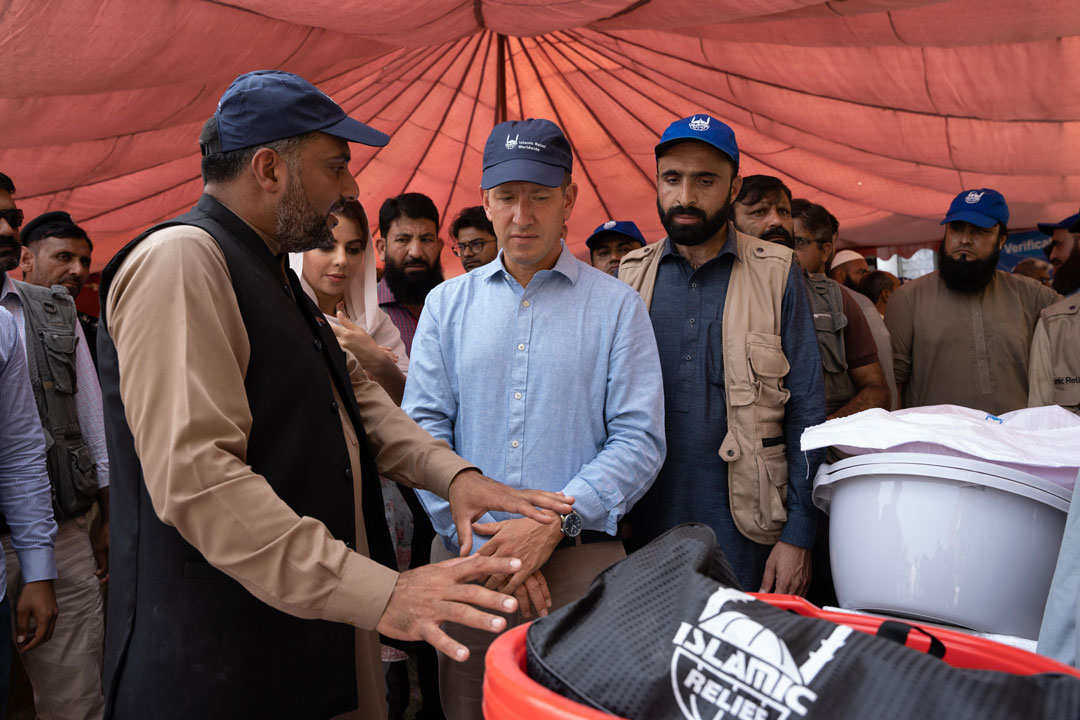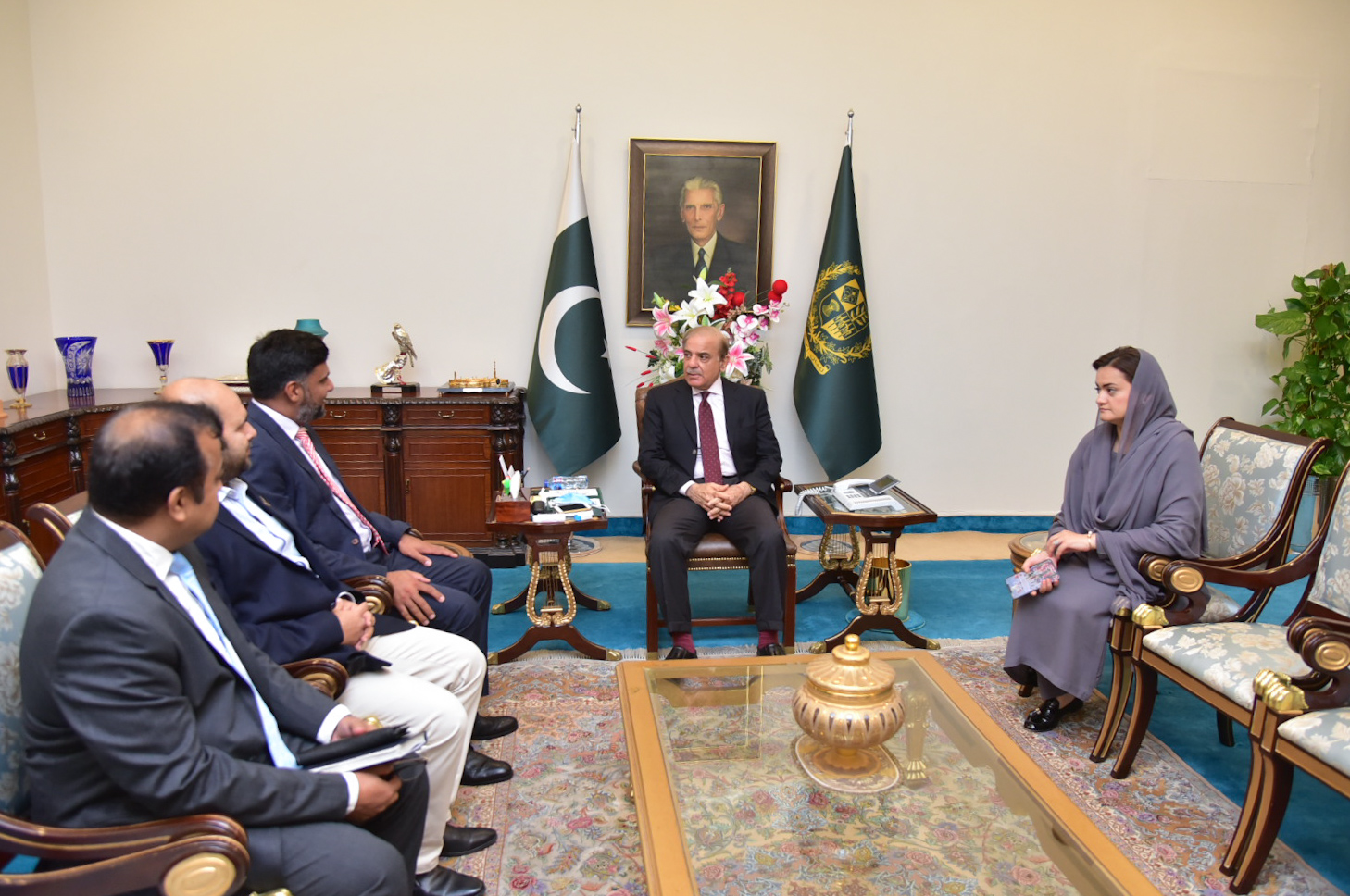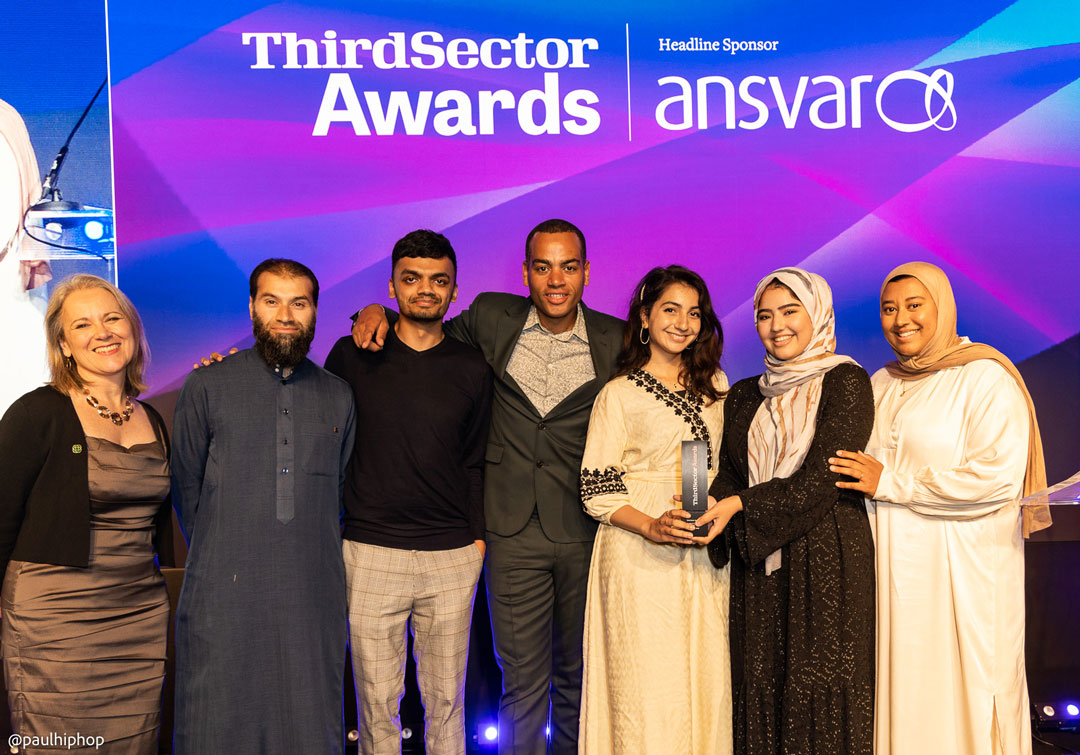40
YEARS OF ISLAMIC RELIEF
Trusted to deliver since 1984

An extract from our first Annual Report, dated December 1984.
Determined to help people in Sudan who had fled famine in neighbouring Ethiopia and what is now Eritrea, a group of medical doctors and activists set up the charity which will become Islamic Relief Worldwide. A 9-year old boy in Cairo, Egypt, gives his 20p pocket money – his generosity making him our first ever donor. From such small acts of kindness, enormous impact will grow as volunteers begin fundraising in mosques in Birmingham, UK.
Volunteers in the UK hire a small office in a Birmingham community centre, and work tirelessly, often long into the night, to raise over £100,000 to respond to the famine in Africa.
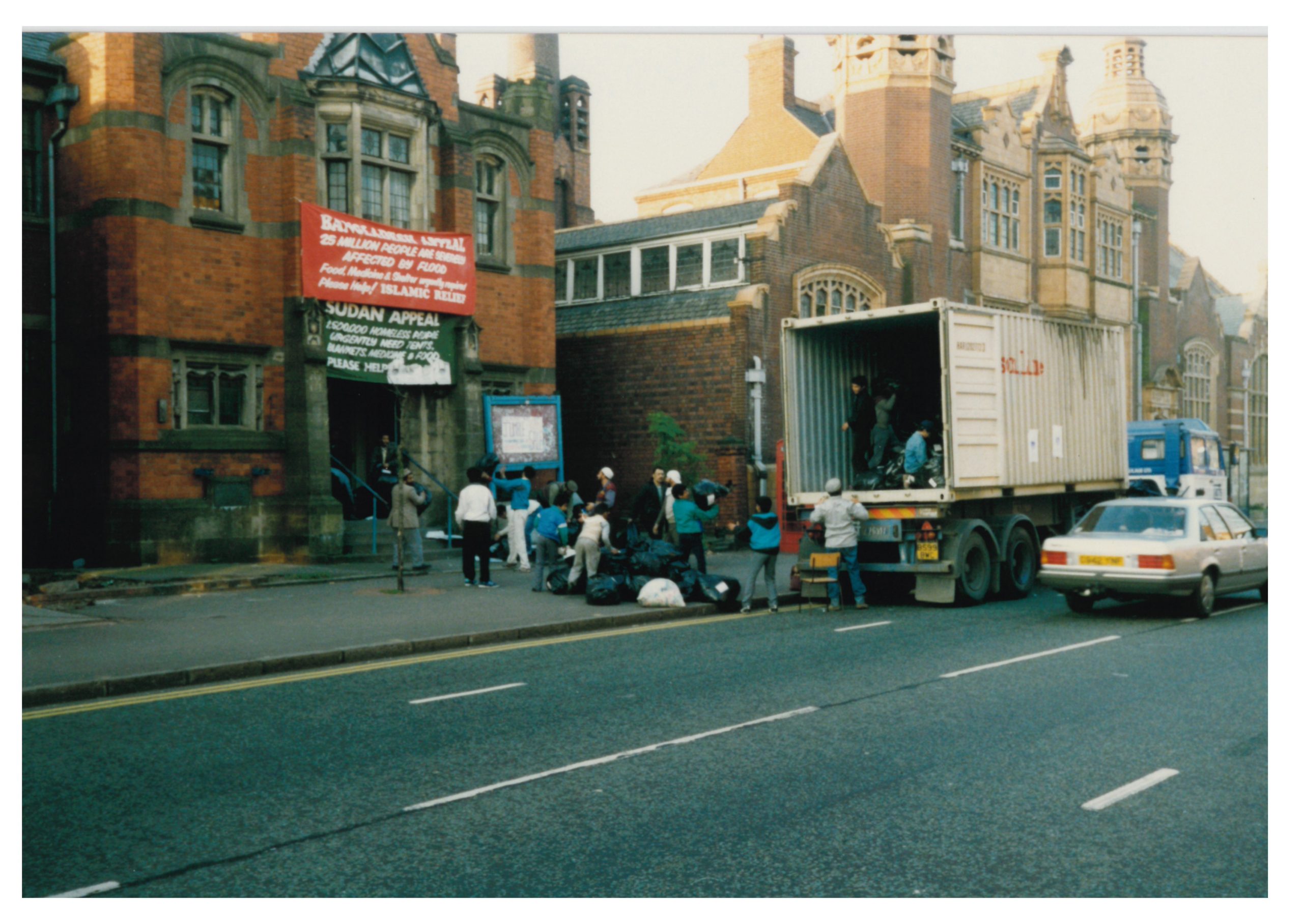
Pictured in 1991, Islamic Relief volunteers at work outside our first office, in Moseley Street, Birmingham, UK.
1986 sees the birth of our qurbani meat distribution programme, which reached over 4 million people in 2022 alone. We also established a separate bank account for zakat, to make sure it was administered separately.
By 1987, Ramadan has become an important fixture in Islamic Relief’s fundraising calendar. The holy month is a sacred period in which Muslims seek to draw closer to God, including by doing good deeds and donating to charity, often in the form of zakat. Among our activities is the affectionately named ‘caravan tour’, in which we drive a van around UK mosques to sell prayer mats and other small items to raise money for humanitarian causes throughout Ramadan.
Devastating flooding in Sudan triggers Islamic Relief’s largest relief operation to date. We send high quality tents, clothes, and water purification tablets, as well as 70,000 vaccines by ship and chartered aircraft.
Islamic Relief prepares a shipping container filled with food and clothing, and sends it to The Gambia on 22 February 1989.
Islamic Relief is registered with the UK Charity Commission and incorporated under the Companies Act.
The Islamic Relief Games begin. They were inspired by a teenager from Birmingham who decided to embark on a sponsored swim in aid of our fledgling charity. In addition to raising an impressive sum for Islamic Relief, the swim generates community excitement and interest. Its success triggers an idea: an annual sports tournament to gather together local and national sports teams for fun and fundraising. A community version of the Olympics, the first ever Islamic Relief Games is held in 1989 and quickly becomes a popular annual fixture for our sporting supporters.
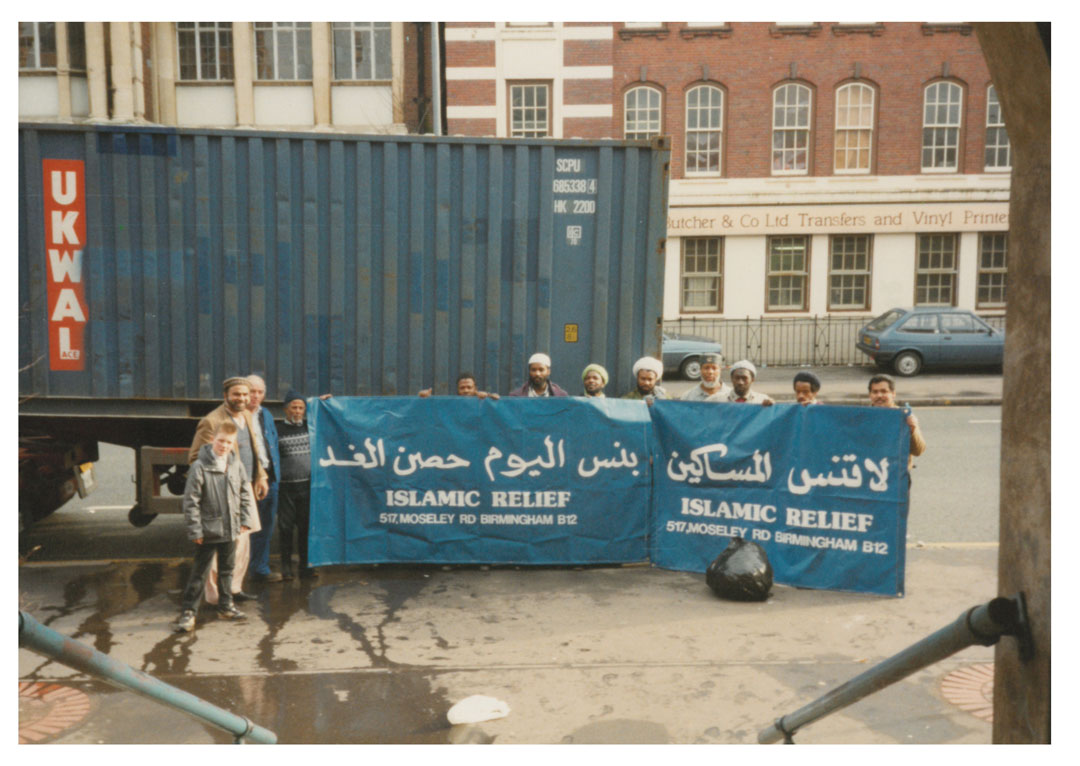
Islamic Relief staff pose in front of a shipping container full of aid bound for The Gambia
Islamic Relief registers offices in Asia, Europe, Africa and the Middle East.
Islamic Relief sends a plane full of humanitarian aid to Iran, to help survivors of a devastating earthquake. The disaster has struck the capital, Tehran, and Manjil and Rudbar cities. On the plane is more than 20,000 relief items, including tents, portable toilets, water, blankets and lamps.
Islamic Relief responds to a powerful cyclone in Bangladesh, opening our first office in the country later that year. The Rohingya people begin fleeing Myanmar, seeking safety in neighbouring Bangladesh, where many face dire conditions in the refugee camps of Cox’s Bazar. Islamic Relief opens a temporary medical centre in Dhechua Palong camp, serving hundreds of people.
We open our first office in Sudan, from which we expand operations to reach even more vulnerable people in the decades ahead. We also register our first office in Albania and purchase the building that is still home to our headquarters in Birmingham, UK.

A plane full of humanitarian aid is loaded ahead of its journey to Iran, which has been devastated by an earthquake
Islamic Relief begins canning qurbani to reduce transportation costs, and so meat can be kept for up to 4 years. To this day, our annual qurbani programme includes canned and fresh meat, depending on what best suits community needs.
Islamic Relief opens our global headquarters in Digbeth, Birmingham, UK, from which we continue to operate to this day. Islamic Relief Sweden is founded this year, with volunteers coordinating fundraising activities from their homes, helped by their families, before finding a basement room from which to operate. Islamic Relief member offices are also founded in France, Belgium and the Netherlands.
The Bosnian War brings Islamic Relief to Bosnia and Herzegovina, becoming one of the first international organisations to deliver humanitarian aid and emergency relief during the conflict. We are a lifeline throughout the Bosnian War, including in besieged Sarajevo, distributing food, clothes, water and firewood through our offices and warehouses.
UK-based newspaper The Independent raises £37,000 to support Islamic Relief’s life-saving aid on the ground during the Bosnian War, including throughout the horrific siege of Sarajevo.
Islamic Relief USA is incorporated in Los Angeles. In addition, we become one of only hundreds of non-governmental organisations at this time to be granted consultative status to the Economic and Social Council of the United Nations (ECOSOC). This status gives Islamic Relief access not only to ECOSOC, but also to its many subsidiary bodies and to the various human rights mechanisms of the United Nations and special events.
Islamic Relief becomes 1 of the only international humanitarian organisations working in Albania, one year after registering in the eastern European country. By 2003 we have opened a community centre and a training centre in northern Albania, and are supporting many schools across the country. We also launch our Orphan Sponsorship Programme in Albania this year, providing a safety net for some of the country’s poorest families.

The editor of The Independent Sir Andreas Whittam Smith and actor Emma Thompson with Islamic Relief founder Dr Hany El-Banna

Women in El-Obeid, Sudan, learn how to use a computer in a community centre supported by Islamic Relief
Islamic Relief becomes the first Muslim non-governmental organisation to receive UK government funding, spending the £160,000 on a community training centre in El-Obeid, Sudan.
Dr Hany El-Banna meets the then-President of Bosnia and Herzegovina, Alija Izetbegovic, to discuss how Islamic Relief can support the country, which is suffering amid the Bosnian War.
Horrifying violence takes place in Rwanda, with Islamic Relief launching an appeal to support humanitarian aid efforts. Later known as the Rwandan genocide, the devastation caused means Islamic Relief will continue providing aid to refugees well into late 1996.
Islamic Relief is the first charity to deliver aid to vulnerable people in Grozny when conflict breaks out in the Chechen Republic in 1995. One of the few international charities helping vulnerable people in the region during the war, our initial focus includes assisting people living in Chechen refugee camps in Ingushetia.
In a refuge for families who’d fled their homes in Chechnya, we hold a special day for the children, with fun activities offering respite from the worry.
Islamic Relief builds our first school in Sudan. Located in Mayo, on the outskirts of Khartoum, Alnasr Basic School provides primary education for children from poor families. In the years ahead, we will build and repair hundreds of schools across the country.

Inside the warehouse of Islamic Relief’s clothes recycling business
Islamic Relief’s clothing recycling business expands operations to manage the huge response to our appeal to help people caught up in the horrors of the Bosnian War. The outpouring of generosity sees the UK-based recycling business sorting clothing itself, rather than selling on bags of donations as it had been doing. Officially incorporated in March 1993, today the company, known as TIC International, raises much-needed funds for our humanitarian work by managing a national chain of charity shops.
The year also sees an important milestone for Islamic Relief in Bosnia – where we have been a lifeline throughout the war – as a 5-year programme of rebuilding 5 primary schools begins.
The Islamic Relief Games, an Olympics-style sporting event in which teams from across the UK competed and raised funds for nearly a decade, comes to an end in 1997.
Islamic Relief launches an enormous intervention in Iraq, where the healthcare system has all but collapsed in the aftermath of the first Gulf War. Among our interventions are sending medical supplies worth over £250,000 to 2 hospitals in Baghdad. Supplies include 6 of the most essential leukaemia medicines, 60 tonnes of antiseptic and disinfectant, and more than 716,000 disposable syringes.

Islamic Relief aid items in Albania, ready to be distributed to refugees fleeing the war in neighbouring Kosova
The Kosova War begins, prompting many people flee their homes. Islamic Relief is a lifeline for refugees in neighbouring Albania, assisting them with survival items.
Islamic Relief registers an office in Gaza, which allows us to remain by the sides of ordinary Palestinians throughout decades of occupation, blockade and recurrent conflict.
The Kosova War ends, and ordinary people face the enormous task of rebuilding their lives and communities. Thousands of civilians have died and at least 1.2 million people are thought to have fled their homes, but refugees begin returning this year. A handful of international charities, including Islamic Relief, help them. Initially we focus on Drenas, the worst affected area, and in the years ahead our operations expand across the country as we support Kosovars to recover from the long-term impacts of the conflict.
Islamic Relief signs the Code of Conduct for the International Red Cross and Red Crescent Movement and NGOs in Disaster Relief – an international standard on working with people affected by emergencies without bias.
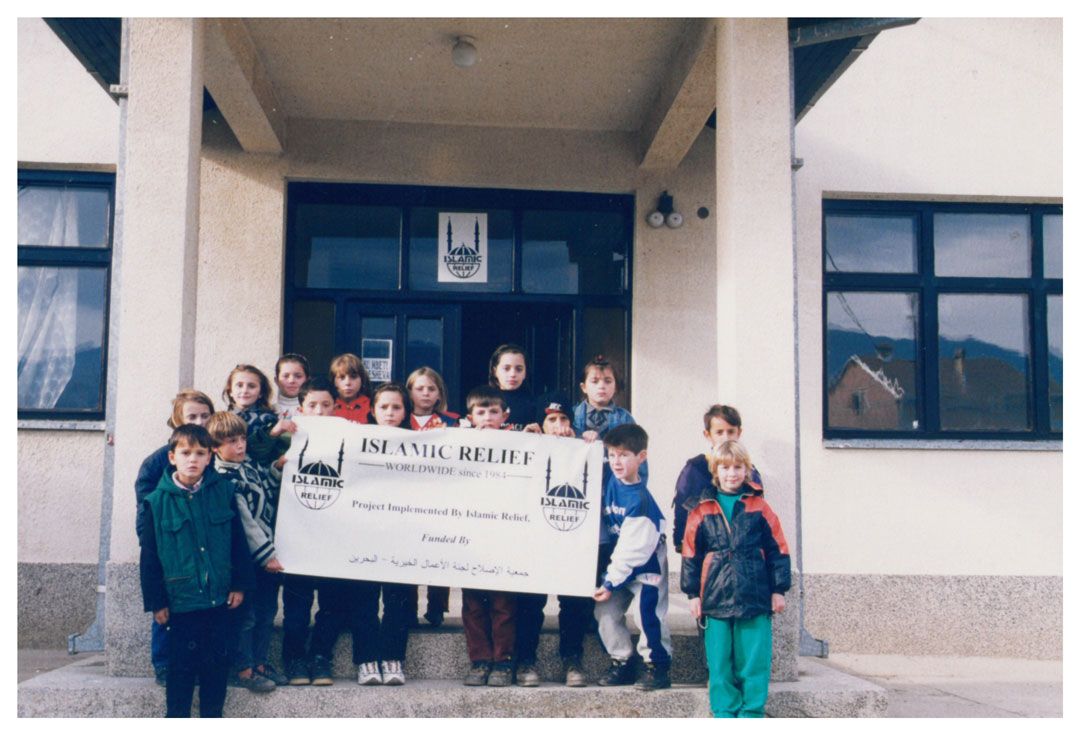
Children at a school in Kosova rebuilt by Islamic Relief after the Kosova War, which ends in 1999
Islamic Relief revives the Islamic tradition of sustainable charitable giving through investment, when we begin implementing waqf projects in 2000.
This year also sees Islamic Relief becomes the first charity in Pakistan to offer small, Shariah-compliant loans to help families build a reliable livelihood.
As America reels from the September 11 attack, Islamic Relief USA is on the ground in New York feeding exhausted rescue workers and organising blood donations for the wounded. We are a lifeline in Afghanistan and the Balochistan region of Pakistan, where many uprooted families struggle to meet even their basic needs. The UK Government provides £1 million in funding, which we match, to provide life-saving aid including setting up several camps for displaced people, such as Leejay Karez.
We complete the process to register Islamic Relief as a charity in Mali; and begin the first of our multi-year sustainable development projects. The scheme, which is funded by the UK Government, is located in Gourma Rharous. It includes installing a community radio so nomadic communities can keep up to date on our projects and services such as vaccination drives and agricultural campaigns. The radio station is still in use today.
HRH Prince Charles – HRH King Charles III – visits our office in Park Road, London.

An Islamic Relief food distribution programme in Ghorband, Afghanistan, where many families flee their homes amid bombing in the aftermath of the September 11 attack.
A Framework Partnership is signed with the European Commission’s Humanitarian Aid (ECHO) department, recognising Islamic Relief’s capacity to deliver aid to a high standard. We begin working in the West Bank, going on to serve on average 100,000 vulnerable people each year through humanitarian and development programmes until 2018, when the Israeli authorities force us to suspend our operations.
In Egypt, our Early Intervention and Rehabilitation Centre (EIRC) is set up around this time and for years supports children with disabilities through therapeutic care and recreational activities.
With a £9 million aid programme, Islamic Relief is one of the few international aid agencies assisting people affected by the war and civil war in Iraq. Operating from an office in Baghdad, Islamic Relief’s operations include sponsoring orphaned children and repairing health centres in the capital city and Anbar.

In Iraq, an Islamic Relief convoy of aid is destined to help families suffering amid conflict

An Islamic Relief aid worker surveys the devastation in Aceh, Indonesia, after a devasting tsunami strikes on 26 December, 2004
Islamic Relief are one of the first aid agencies to deliver lifesaving aid in Indonesia after the Indian Ocean tsunami. We distribute food, medicine, tents and hygiene supplies, providing ambulances and mobile health clinics, and send 2 cargo planes packed with 30,000kg of medical supplies and 28,000kg of hygiene items. We also hand out 48,000 litres of water, every day, and in the months and years ahead, we deliver major disaster recovery projects to help communities build back better.
A severe earthquake in Iran sees Islamic Relief distributing lifesaving aid, with donors including – for the first time – the Swiss government, which pledged 100,000 CHF (approx. £91,000).
Islamic Relief Malaysia is incorporated this year, and the following year is officially launched by then-Prime Minister Dr Mahathir Mohamed in Kuala Lumpur.
Our relationship with the Catholic Aid Agency for Overseas Development (CAFOD) is formalised, as we sign a Memorandum of Understanding to work together where possible, for at least 3 years.
This is the year in which Islamic Relief joins the UK’s respected Disaster Emergencies Committee (DEC) – the first and still the only Muslim charity to do so.
We begin working in Sri Lanka, as our emergency response to the Indian Ocean earthquake and tsunami continues. With an initial focus on meeting the basic needs of survivors, Islamic Relief’s attention later turns to post-disaster recovery. Our work includes building temporary shelters in a ‘cash-for-work’ project, funded by the UK government, which enables local people to earn a living while supporting the scheme.
An earthquake devastates communities in Afghanistan, India, and Pakistan. Tens of thousands of people are killed and 3.5 million others lose their home. Islamic Relief launches what will prove to be our biggest emergency response to date, raising an incredible £35 million to help survivors. Among the first aid agencies to respond, we are soon providing emergency relief to people in Pakistan-administered Kashmir and the North West Frontier Province; and in the months ahead turn our attention to helping communities rebuild. We build transitional shelters, help restore lost livelihoods and support communities to become self-reliant. The following year, Pakistan’s then-president, General Pervez Musharraf, presents Islamic Relief’s country director in Pakistan, Adil Al-Mahi, with the ‘Star of Dedication’ Award, stating, “This is an acknowledgement of the tremendous work of Islamic Relief’s Pakistan staff. The team has worked tirelessly to help the survivors of the earthquake.”
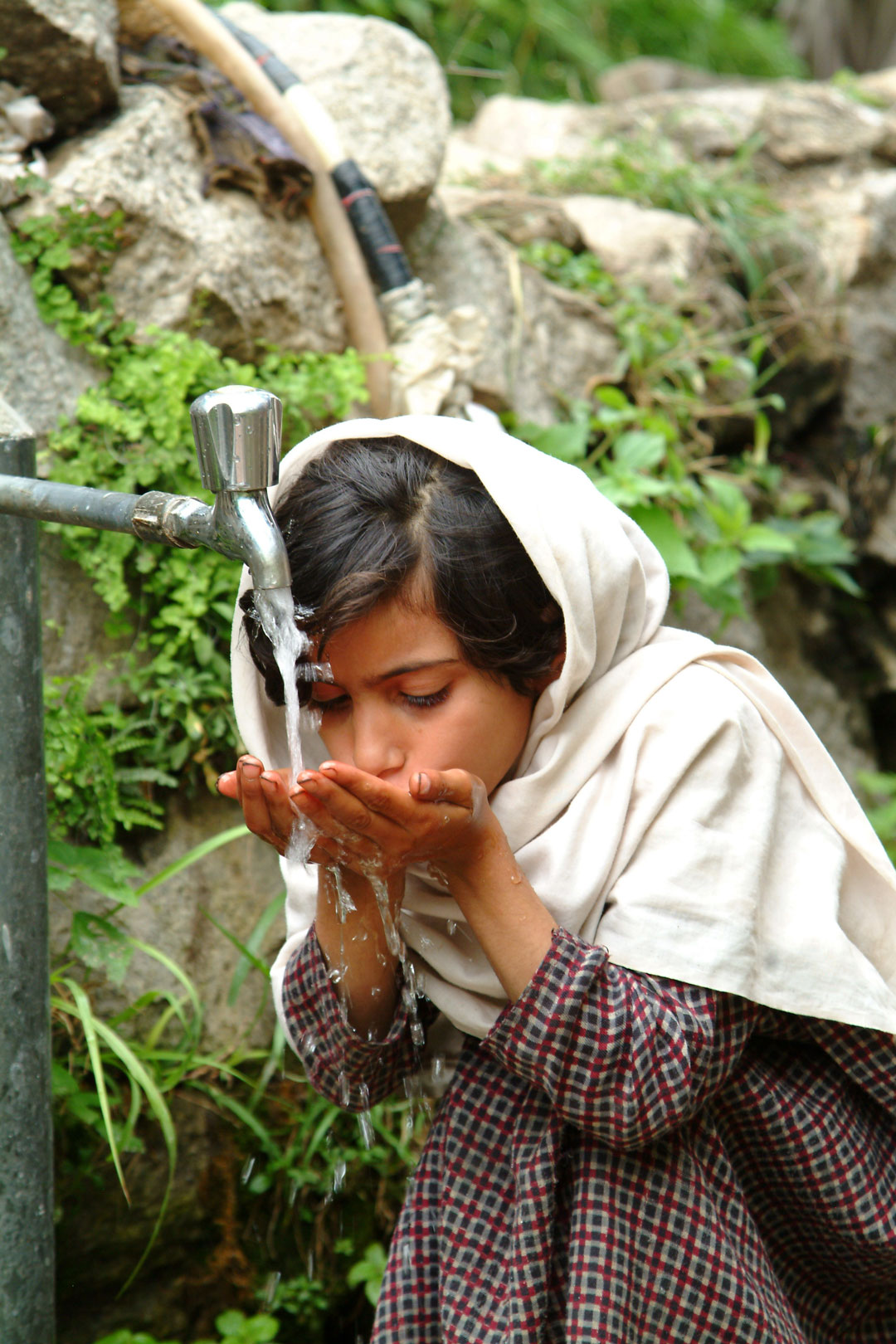
A girl in Pakistan-administered Kashmir drinks from one of over 40 water points installed by Islamic Relief following the South Asia earthquake
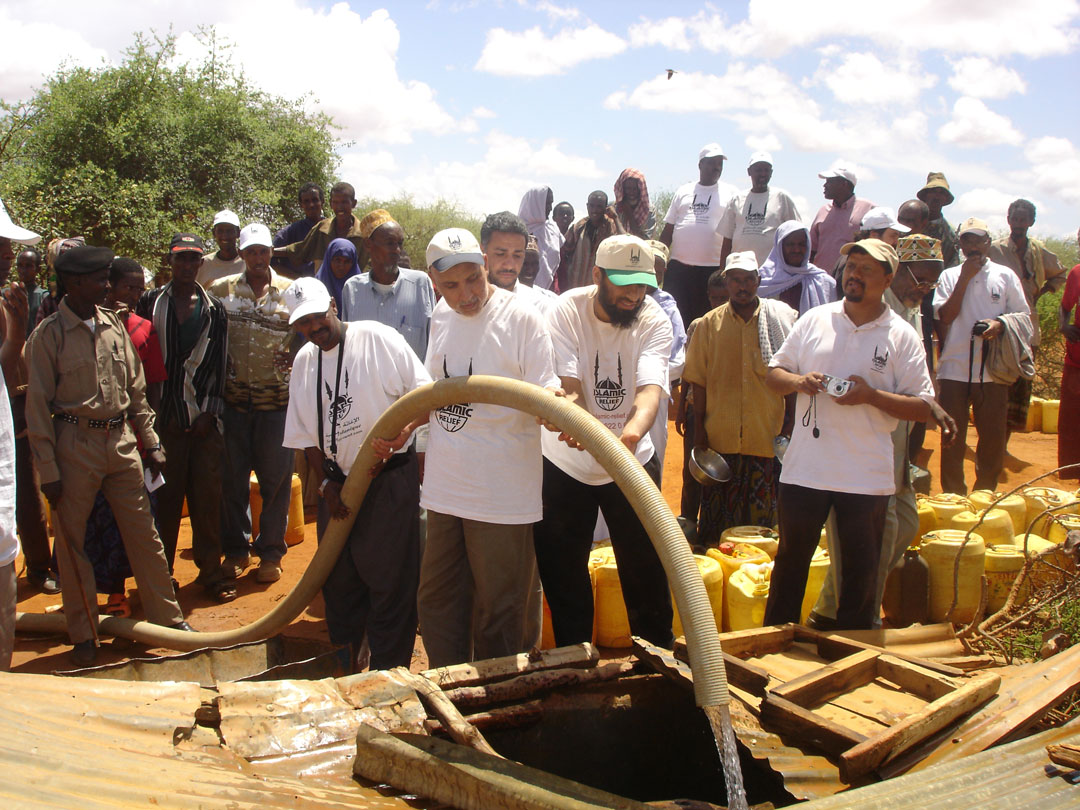
Islamic Relief founding member Dr Hany El-Banna helps with a water well in Kabo village, Kenya, where we are providing around 4,000 people with clean drinking water
Drought in the Horn of Africa is at its height, with 15 million lives at risk. Across the region across the region Islamic Relief is running feeding centres and providing clean water and healthcare. We also open our first office in Kenya, from which we deliver a groundbreaking partnership with the European Commission for Humanitarian Aid (ECHO) to repair water points and tackle malnutrition in Mandera County.
In Yemen we begin a vital orphans and child welfare programme. In the years that follow, thousands of vulnerable children will benefit from support with their basic needs and schooling.
A new Islamic Relief Worldwide director begins developing fundraising in the United Kingdom, an important milestone in what will, in the years ahead, become influential powerhouse, Islamic Relief UK. In addition we register an office in Canada, which will grow into the country’s largest Muslim charity. We sign Cooperation Agreement with the International Organization for Migration (IOM) and a Memorandum of Understanding with the United Nations World Food Programme (WFP).
The UK government’s Department for International Development (DFID), now Foreign, Commonwealth & Development Office (FCDO), pledges funding for Islamic Relief projects to assist uprooted families in Chad, to provide humanitarian aid to flooded communities in Pakistan, and work on HIV/Aids.
In 2007, Sabrina Salim addresses an international consultation on Islam and HIV/Aids, run by Islamic Relief in South Africa with funding from DFID, now FCDO.
Islamic Relief Worldwide signs partnership agreements with DFID, the UN World Food Programme and the International Organization for Migration.
Our work in Lebanon receives institutional funding for the first time, when United Nations agency UNICEF and the European Union support our work to improve access to water, sanitation and hygiene for Palestinian refugees in Naher al Bared camp.

An Islamic Relief update details the devastation in Gaza during a 22-day war
The 22-day war in Gaza devastates lives, and Islamic Relief’s £20 million emergency appeal provides a lifeline.
Islamic Relief Iraq receiving funding from the United Nations refugee agency, UNHCR, to set up and run Al-Waleed camp, which provides shelter for Palestinian refugees in Al-Qaim, Anbar.
Islamic Relief signs a Memorandum of Understanding with The Jordan National Red Crescent Society, committing to cooperate on food distribution projects, in-kind donations, and orphan sponsorship.
Islamic Relief responds to a massive earthquake in Abruzzo, central Italy. We distribute lifesaving aid to survivors, help set up shelters for affected families, and meet Pope Benedict XVI when he visits the area 3 weeks after the disaster.
Islamic Relief teams up with Christian Aid to build our first cyclone shelter in Bangladesh, providing a safe space for 500 families and their cattle in Patuakhali.

Children shelter in a tent as Pakistan experiences the worst floods in living memory. Islamic Relief responds with a major relief and reconstruction operation serving 428,000 people in over 580 villages
Flooding, along with drought, fuels suffering in Niger. The west African country is gripped by a food crisis, which Islamic Relief works to tackle. One of our projects works with 5 schools in the Tillaberi region, showing children and their families how to grow nutritious food. Hundreds of fruit trees are planted at the schools and in household gardens; and mothers learned how to identify and respond to malnutrition in children.
Kenya, like other east African countries, is also suffering a food crisis brought on by successive droughts. Our response incorporates an integrated project which improves access to water, healthcare, and nutrition for almost 50,000 people in the North Eastern Province.
A massive earthquake strikes the Caribbean island of Haiti. Islamic Relief is among the first humanitarian agencies on the ground, delivering food and survival items to survivors. We set up the first organised camp for families that have lost their homes, going on to found a further 2 camps. We provide safe drinking water, toilets, and shelter; and we help Haitians rebuild their lives and communities by repairing schools, providing cash-for-work opportunities, and vocational people.
We receive an award from the then-President of Indonesia, Susilo Bambang Yudhoyono, for our life-saving work supporting communities after the 2004 earthquake in Aceh.
2021 also sees Islamic Relief and the World Health Organization (WHO) sign an agreement pledging to strengthen our collaboration to address the health needs of vulnerable people.
In a year of popular uprisings and protests as well as great suffering across North Africa and the Middle East, Islamic Relief is among the first international organisations to respond at the outbreak of the conflict in Libya, providing medical aid, baby milk, food and hygiene items, and respite care for children with disabilities. As people flee the violence there, and in Tunisia and Syria, Islamic Relief manages refugee camps, and provides survival items, food parcels and educational support.
Islamic Relief launches an emergency appeal as a tsunami devastates parts of Japan; and are at the forefront of providing emergency aid as East Africa experiences its worst drought in 60 years. With 10 million people in the region facing starvation as the rains fail yet again, food prices rise beyond the reach of the poorest, many flee fighting in Somalia. Islamic Relief ploughs £22 million into humanitarian assistance in Kenya, Somalia, and Ethiopia, providing food aid to over 1 million people and giving clean drinking water to more than 400,000 individuals.

An Islamic Relief aid worker surveys a refugee camp for Libyans which springs up on the Tunisian border during the Arab Spring

An Islamic Relief aid worker examines a damaged building deep inside Syria
Islamic Relief gains humanitarian access to Syria. We remain on the ground as the humanitarian situation deteriorates over the grim years ahead. One of the largest charities operating in the country, we assist vulnerable people with lifesaving aid and support to rebuild their lives. Islamic Relief is also active in several neighbouring countries, where many Syrian refugees rely on our assistance. These includes Jordan, where, after years of working through local partners, we gain official registration in 2012.
As conflict forces tens of thousands of people to flee their homes in Rakhine State, Myanmar, we respond with vital aid. We provide over 6,100 food parcels to vulnerable Muslim and Buddhist communities cut off by the fighting, and construct essential facilities for displaced people. We also build shelters, tube wells, bathing facilities and latrines in the Syi Tha Mar Gyi camp.
More than 630,000 people flee their homes in the Philippines as Typhoon Haiyan traces a path of devastation. Determined to assist affected families, Islamic Relief faces challenges such as blocked roads and damaged airports, but our food aid reaches almost 20,200 families, and thousands of tents, tarpaulin and shelter repair kits also help survivors.
We step up our commitment to transparency, accountability and excellence, as we became an affiliate member of a rigorous international charter, the INGO Accountability Charter Company. We now report against the charter principles which include good governance, responsible advocacy, effectiveness and ethical fundraising.
Islamic Relief becomes a co-owner and member of the International Civil Society Centre, the leading global action platform for international civil society organisations.
Islamic Relief Spain, based in Madrid, is registered as an independent partner office. The European Commission extends a Framework Partnership Agreement with us – which has been in force since 2008 – by another year.

Eden stands near her ruined home, which came crashing down when Typhoon Haiyan barrelled into the Philippines

Our village has changed dramatically because of your support. Thanks for improving our environment and living conditions,” says Zhu Chongrong, 66, who lives with his wife and grandson in Lingshan village, China. His village is among 3 transformed by an Islamic Relief integrated development project in 2014. It includes building health clinics, a school, and a cultural centre. It has also improved roads, planted trees, and installed toilets and water and environmentally-friendly energy sources
Islamic Relief and the Lutheran World Federation forge the world’s first official cooperation between a global Islamic and Christian humanitarian organisation. We joined a consortium of other charities in the influential Start Network.
Our relationship with the UK government’s then Department for International Development (DFID) is further cemented with a 2-year extension of a Memorandum of Understanding that we had signed in 2011.
Our training and development organisation, the Islamic Relief Academy, become fully operational. In the years ahead it grows into the Humanitarian Academy for Development (HAD), an award-winning organisation that develops talent within Islamic Relief and the wider humanitarian sector. HAD has now supported scores of charities around the world, including in Iraq, Yemen, Syria, and Tanzania, to develop their skills and knowledge.
Islamic Relief is among the first to distribute lifesaving aid after a devastating earthquake in Nepal. Our emergency response is followed by comprehensive recovery support to help rebuild shattered communities. In the years ahead we build 151 earthquake-resistant homes; repair drinking water systems in remote communities high in the mountains; and help vulnerable ethnic Tamang communities to rebuild their livelihoods.
Islamic Relief signs a Memorandum of Understanding with the African Union, committing to 3 years of cooperation on efforts to tackle poverty and sustainable development in Africa.

Children in Nepal wait to receive food from Islamic Relief in the aftermath of an enormous earthquake
Islamic Relief signs a ground-breaking agreement with UN Women to collaborate on justice for women and girls in the Muslim world. Special focus areas are to be assisting women and girls who are refugees or living in conflict-affected communities, preventing gender-based violence, and improving discourse on women’s rights in Islam.
Islamic Relief helps to create the landmark Islamic Declaration on Climate Change, calling for an urgent action to save the planet, which is presented to the United Nations.
In 2017 escalating violence in Myanmar causes more Rohingya people to flee the country, many of them seeking safety in neighbouring Bangladesh. Our life-saving work with refugees receives a much-needed boost, as we partner with PULSE, a local organisation approved by the Bangladeshi authorities to work in the refugee camps of Cox’s Bazar. We scale up funding for emergency programmes which supply food packs, shelter and hygiene supplies to 300,000 people. What’s more, teaming up with PULSE builds the local charity’s capacity to deliver more aid in the future.
Islamic Relief becomes only the tenth organisation in the world to attain Core Humanitarian Standard (CHS) certification. The rigorous global standard is made up of 9 commitments designed to ensure that charities best meet the needs of the communities they serve. Recertification in 2023, makes Islamic Relief one of only 5 UK-based charities, and the only UK-based Muslim faith-inspired charity, to hold the certification.
We sign a Memorandum of Understanding with the Iraqi Red Crescent Society, pledging closer collaboration for at least 3 years.
Climate change was a key theme in our work. We implemented over 50 climate-related projects in 14 countries – and also called on world leaders to take action. At the UN Climate Change Conference (COP23) in Bonn, Germany, we contribute our climate expertise with the launch of a report, Climate Champions. We highlight our work with faith communities through a coalition supporting faith-based climate advocacy, and Islamic Relief Germany co-host an insightful workshop on the power of Islamic climate finance. Meanwhile, our staff and volunteers join people of different faiths on bicycles and bicycle rickshaws to deliver a multi-faith statement promising to adopt sustainable behaviours and urging world leaders to do the same.

“What Islamic Relief is doing, what you are doing as volunteers […] in our daily lives as Canadians is something worth celebrating. So thank you very much, shukran, for letting me be part of this,” says Canada’s Prime Minister Justin Trudeau, speaking in 2017 as he helped Islamic Relief prepare Ramadan food parcels in Montréal, Canada

HRH Princess Anne presents the Princess Royal Training Award to Abdulla Almamun, National Volunteer Coordinator for Islamic Relief UK
Abdulla Alamun, National Volunteer Coordinator for Islamic Relief UK receives the Princess Royal Training Award, making Islamic Relief the first humanitarian organisation to be awarded the accolade. It recognises our 2-year programme, RespondIR, which is delivered by the Humanitarian Academy for Development (HAD) and the British Red Cross. It trains volunteers to be able to respond to emergencies across the UK and manage their own health and wellbeing when confronted by difficult scenarios.
Islamic Relief establishes our first office in Ireland, working out of a storage unit in the yard of a mosque. Focusing initially on fundraising to support desperately needed humanitarian aid for Syria, in the years ahead it grows into Ireland’s largest Muslim charity.
The Prime Minister of Pakistan commends Islamic Relief’s work in supporting the country’s socioeconomic development.
In just 20 days Swedish influencer Queen Feyli raises over 1.6 million (over £120,000) SEK to fund vital Islamic Relief programming, inspiring many others to take to social media to support our work.
Homes collapse, crops are ruined and food stores are swept away as flash flooding devastates Mali.
Islamic Relief gives over 1,200 families cash vouchers so they can buy essentials like food, blankets, cookware, and hygiene products.
A pioneering organisation, set up by Islamic Relief, rebrands itself the International Waqf Fund. One of just a few UK-based organisations offering waqf (a type of endowment) as a way to donate to charitable causes, the organisation helps fund important humanitarian and development work while reviving interest in this sustainable form of Islamic giving.
Islamic Relief is awarded the Bond Innovation Award, recognising the impact of our integrated programme in Bangladesh. Subsequently replicated by local government in Bangladesh, the programme combined education and protection for orphaned children with empowering their families to become self-sufficient within 4 years.

A mother collects cleaning products, facemasks and water containers distributed by Islamic Relief in Daynile camp near Mogadishu, Somalia
Across the world the Covid-19 pandemic is overwhelming countries and taking millions of lives. Restrictions designed to halt its deadly spread force schools and businesses to close, and poverty and deprivation shoot up.
Our Covid-19 response in Somalia gives over 63,000 vulnerable people access to healthcare services and medicines, hygiene kits and handwashing facilities.
As many charities scale back their activities, Islamic Relief redoubles our commitment to the vulnerable people who rely on us, finding new, safer ways to deliver our vital programming. We also launch an emergency response that, by the end of the year, helps protect millions of people in 26 countries from the devastating consequences of the virus.
Islamic Relief engaging extensively with the pivotal climate summit, COP26, urging world leaders to invest in supporting communities on the frontlines of the climate emergency.
A new 3-year year collaboration period forged with UNICEF, a first for both organisations, which sees us combine forces on fundraising, implementation and advocacy to improve the lives of vulnerable children.
Excitingly, 3 years after Islamic Relief registered as a charity in Norway, a small team begin fundraising, and within a year they support life-saving aid in flood-stricken Bangladesh.

In camps in Sittwe, in Myanmar’s Rakhine State, families move into more than 60 long shelters built by Islamic Relief. Constructed from materials designed to withstand harsh weather conditions, these shelters provide over 170 families with a safe and comfortable place to live
Historic floods see one-third of Pakistan submerged, with widespread devastation and suffering. Islamic Relief gives food, tents and survival items to survivors. We team up with UNICEF to provide over 1 million litres of drinking water, and with the United Nations Development Programme (UNDP) on a partnership that ensures local people can earn a living as they help to repair their communities. We build permanent shelters for families that lost their homes, and temporary learning centres so children do not miss out on learning. Altogether we reach 1 million affected people.
Islamic Relief UK is awarded Charity of the Year at the prestigious Third Sector Awards.
We announce a major new partnership with the UN Development Programme (UNDP) to inject cash into the economy, boost food production and support small businesses across Afghanistan.
An unprecedented escalation in the Middle East kills thousands of civilians. Israel tightens its siege on Gaza – preventing food, fuel, and medicine from entering – and ordering families to evacuate parts of the enclave. Bombs strike residential buildings and vital services such as schools and hospitals. Supplies of essentials such as food, fuel and medicine quickly run catastrophically low, and the already struggling health sector faces total collapse. Islamic Relief, which has an office and staff in Gaza, condemns all violence against all civilians and calls for an immediate ceasefire. In the weeks ahead, our incredible staff do all they can to help others. They work with our local partners to provide food, water, blankets and hygiene items to families fearing for their lives.
Islamic Relief provides life-saving aid in Morocco for the first time, in the aftermath of a powerful earthquake. We launch a £10 million appeal and our humanitarian interventions begin with distributing vital items such as blankets and mattresses to traumatised survivors. Just days later, fierce floods devastate communities in Libya. Again, we swing into action, sending out an emergency team and working through local partners to help people whose homes have been destroyed with food and other essentials like soap and blankets.
Islamic Relief responds when a powerful earthquake strikes in Türkiye and Syria, and more quakes shatter communities in Afghanistan and Nepal.
Islamic Relief Worldwide embarks on an ambitious new global strategy. It promises we will be innovative in programming, bold in advocacy and fearless in our commitment to those we serve.

Islamic Relief distributes aid during an unprecedented escalation in Gaza
